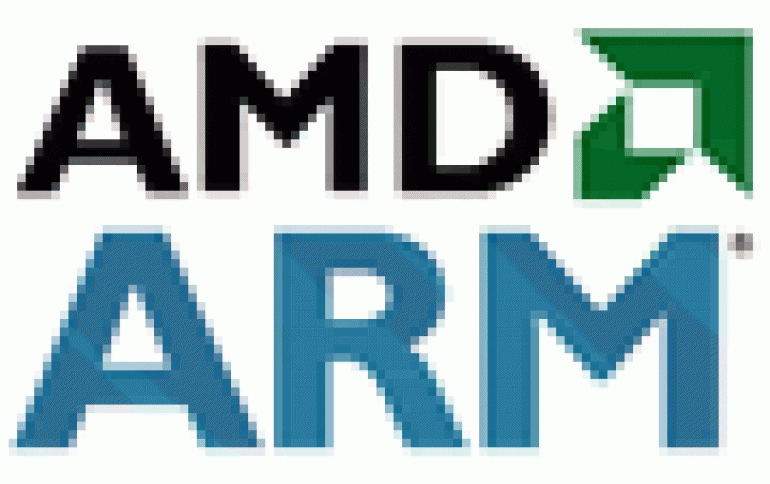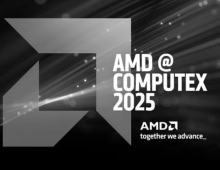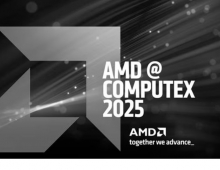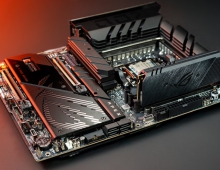
AMD To Develop 64-bit ARM Processors For Servers
Advanced Micro Devices (AMD) and ARM Holdings on Monday announced an agreement to offer datacenter-class microprocessors based on both ARM and x86 architectures.
AMD will produce ARM technology-based AMD Opteron processors for servers in 2014.
The new processors will embed the AMD SeaMicro Freedom fabric, a supercompute fabric that can link small cores and large cores regardless of CPU ISA, memory, storage and input/output traffic with up to 1.28Tb/s speed.
AMD will not put x86 and ARM cores into the same server chips, but plans to develop common building blocks that will be used for both x86 and ARM microprocessors.
AMD also said that despite today's announcement, it will continue to build x86 CPUs and APUs for client and server markets.
SeaMicro was bought by AMD for US$334 million.
AMD's new design initiative addresses the demand to deliver better performance-per-watt for dense cloud computing solutions.
The announcement was made by AMD President and Chief Executive Officer Rory Read, and Senior Vice President and General Manager Global Business Units Lisa Su at a news conference on Monday in San Francisco.
"AMD led the data center transition to mainstream 64-bit computing with AMD64, and with our ambidextrous strategy we will again lead the next major industry inflection point by driving the widespread adoption of energy-efficient 64-bit server processors based on both the x86 and ARM architectures," said Rory Read, president and chief executive officer, AMD. "Through our collaboration with ARM, we are building on AMD's rich IP portfolio, including our deep 64-bit processor knowledge and industry-leading AMD SeaMicro Freedom supercompute fabric, to offer the most flexible and complete processing solutions for the modern data center."
"The industry needs to continuously innovate across markets to meet customers' ever-increasing demands, and ARM and our partners are enabling increasingly energy-efficient computing solutions to address these needs," said Warren East, chief executive officer, ARM. "By collaborating with ARM, AMD is able to leverage its extraordinary portfolio of IP, including its AMD Freedom supercompute fabric, with ARM 64-bit processor cores to build solutions that deliver on this demand and transform the industry."
This strategic partnership with ARM represents the next phase of AMD's strategy to drive ambidextrous solutions in emerging mega data center solutions.
"Over the past decade the computer industry has coalesced around two high-volume processor architectures -- x86 for personal computers and servers, and ARM for mobile devices," observed Nathan Brookwood, research fellow at Insight 64. "Over the next decade, the purveyors of these established architectures will each seek to extend their presence into market segments dominated by the other. The path on which AMD has now embarked will allow it to offer products based on both x86 and ARM architectures, a capability no other semiconductor manufacturer can likely match."
AMD also partnered with ARM earlier this year to use its TrustZone security technology in AMD processors, but it hasn't announced any plans yet to build an ARM-based CPU.
ARM is ecpected to announce its first 64-bit processor designs at its TechCon conference.
The new processors will embed the AMD SeaMicro Freedom fabric, a supercompute fabric that can link small cores and large cores regardless of CPU ISA, memory, storage and input/output traffic with up to 1.28Tb/s speed.
AMD will not put x86 and ARM cores into the same server chips, but plans to develop common building blocks that will be used for both x86 and ARM microprocessors.
AMD also said that despite today's announcement, it will continue to build x86 CPUs and APUs for client and server markets.
SeaMicro was bought by AMD for US$334 million.
AMD's new design initiative addresses the demand to deliver better performance-per-watt for dense cloud computing solutions.
The announcement was made by AMD President and Chief Executive Officer Rory Read, and Senior Vice President and General Manager Global Business Units Lisa Su at a news conference on Monday in San Francisco.
"AMD led the data center transition to mainstream 64-bit computing with AMD64, and with our ambidextrous strategy we will again lead the next major industry inflection point by driving the widespread adoption of energy-efficient 64-bit server processors based on both the x86 and ARM architectures," said Rory Read, president and chief executive officer, AMD. "Through our collaboration with ARM, we are building on AMD's rich IP portfolio, including our deep 64-bit processor knowledge and industry-leading AMD SeaMicro Freedom supercompute fabric, to offer the most flexible and complete processing solutions for the modern data center."
"The industry needs to continuously innovate across markets to meet customers' ever-increasing demands, and ARM and our partners are enabling increasingly energy-efficient computing solutions to address these needs," said Warren East, chief executive officer, ARM. "By collaborating with ARM, AMD is able to leverage its extraordinary portfolio of IP, including its AMD Freedom supercompute fabric, with ARM 64-bit processor cores to build solutions that deliver on this demand and transform the industry."
This strategic partnership with ARM represents the next phase of AMD's strategy to drive ambidextrous solutions in emerging mega data center solutions.
"Over the past decade the computer industry has coalesced around two high-volume processor architectures -- x86 for personal computers and servers, and ARM for mobile devices," observed Nathan Brookwood, research fellow at Insight 64. "Over the next decade, the purveyors of these established architectures will each seek to extend their presence into market segments dominated by the other. The path on which AMD has now embarked will allow it to offer products based on both x86 and ARM architectures, a capability no other semiconductor manufacturer can likely match."
AMD also partnered with ARM earlier this year to use its TrustZone security technology in AMD processors, but it hasn't announced any plans yet to build an ARM-based CPU.
ARM is ecpected to announce its first 64-bit processor designs at its TechCon conference.





















